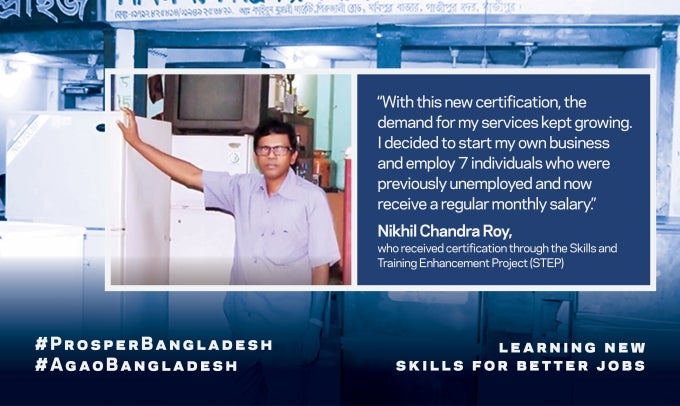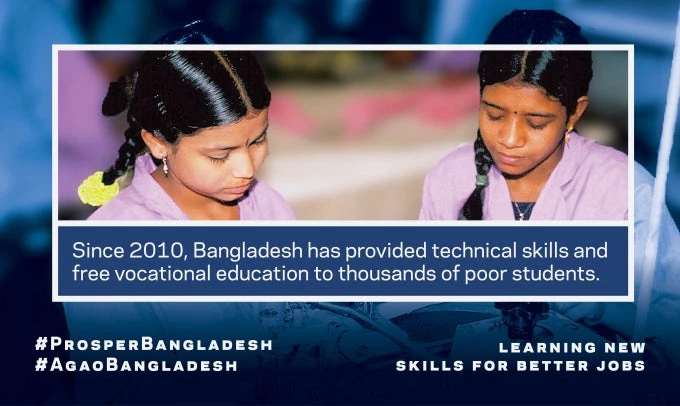
In 2014, Nikhil Chandra Roy was struggling to find and keep regular employment. He had extensive experience dating back to 1977, doing the work of an electrician. But because he had no formal training or certification, Nikhil couldn’t win the confidence of employers in Bangladesh to give him anything more than episodic, relatively low-paying work.
At age 55, just as he was giving up hope for career progress, Nikhil saw an advertisement that ended up turning his outlook and life around. The ad introduced him to the Recognition of Prior Learning (RPL) program, aimed especially at people like Nikhil, who have real skills and experience in a particular occupation but no formal, independently recognized qualifications.
Not long later, Nikhil participated in a three-day program, which entails one day of assessment and two days of training. That led to the recognition he had long awaited and needed to boost his career: a Government-endorsed skills certification from the Bangladesh Technical Education Board (BTEB) in electrical installation and maintenance.

toward #ProsperBangladesh
“From that point on,” Nikhil said, “there was no looking back. With my years of experience, knowledge and now skills certification, I was ready to progress my career from just an electrician to an entrepreneur.”
Nikhil was one of the many vulnerable informal sector workers in Bangladesh who have no regular jobs and who work on ad hoc opportunities, making it difficult to sustain livelihoods. These workers, with enough experience to perform the technical work well but not the credential many jobs require, improve their employability and bargaining power in job markets when they get the proper certification. And with that certification, workers gain social status in their communities.
The RPL program, which evaluates the skills level of workers and issues government certification to workers who pass an assessment, has operated since 2014 as a pilot activity under the Skills and Training Enhancement Project (STEP). STEP aims to give more Bangladeshis the technical skills they need to compete successfully in domestic and international labor markets.
The demand for RPL certification has been enormous. Since its inception, RPL has assessed more than 9,000 applicants from all over Bangladesh. Every month, RPL offers 600 applicants certification trainings in electrical installation and maintenance; IT support; block, boutique and screen printing; sewing machine operation; tailoring and dress making; motorcycle servicing; plumbing; and welding.
STEP has plans to expand the program to reach 30,000 beneficiaries over the next two years. In Bangladesh, where more than 80 percent of the workforce is employed in the informal sector, opportunities to certify informal workers’ skills and create pathways to better jobs and earnings can improve the lives of millions.
The first few years of the RPL pilot program has shown it is highly effective in boosting employment opportunities, career prospects and wage levels for informal and unemployed workers. A recent study of RPL found that around two-thirds of those certified competent experienced salary raises, in some cases, double what they had earned before. Certification also enabled many workers to move from part-time work to full-time jobs and lower-ranking staff to more senior positions in private companies.
For Nikhil, the jump was profound and satisfying. Because of his certification through RPL, he went from earning a salary of BDT 10,000 per month (the equivalent of $125) as an informal worker to about around BDT 75,000 per month ($938), progressing not just as a worker but as an entrepreneur, who is building a business of his own.



Join the Conversation